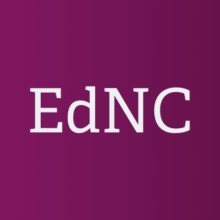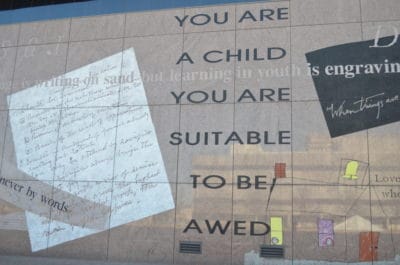The following is a press release from the Public School Forum of North Carolina
The Public School Forum of North Carolina, in partnership with Duke Policy Bridge and the Samuel DuBois Cook Center on Social Equity at Duke University, announced today the first in a series of annual summits and convenings focused on race, equity and education in North Carolina under the banner “Color of Education.” (Twitter: #ColorOfEducation). The kick-off event will feature award-winning New York Times Magazine reporter Nikole Hannah-Jones.
“Color of Education: An Evening with Nikole Hannah-Jones”, will be held on Tuesday, October 2nd at 6:00 PM on the campus of Duke University at Penn Pavilion. Tickets for the event are $25 and will be on sale beginning Wednesday, August 8th via the Duke University Box Office web site: https://tickets.duke.edu/online/article/nikolehannahjones18. The event is sponsored in part by the Grable Foundation.
Nikole Hannah-Jones is a UNC-Chapel Hill graduate school alumnus and former (Raleigh) News & Observer reporter. She was named a 2017 MacArthur Genius Grant Fellow (one of only 24 people chosen, globally) for “reshaping national conversations around education reform” and for her reporting on racial resegregation in our schools. This is the latest honor in a growing list: she’s won a Peabody, a Polk, and, in 2017, a National Magazine Award for her story on choosing a school for her daughter in a segregated city.
Nikole’s brilliant talks explore the important roles schools play in their communities, how they’re affected by their surrounding neighborhoods, and how seeing race from the lens of education tells a whole new story of inequality in America.
In 2019 and beyond, “Color of Education” will evolve into an annual summit as well as other statewide and regional gatherings, bringing together educators, policymakers, experts and other key stakeholders focused on achieving racial equity and eliminating racial disparities in education.
“Nikole Hannah-Jones is one of the country’s most respected and influential voices on issues of race and education and we’re thrilled to have her kick-off this new phase of our work to address the systemic inequities and barriers facing students of color in North Carolina,” said Keith Poston, President and Executive Director, Public School Forum of North Carolina.
“Nikole Hannah-Jones’ visit to campus is an exciting prelude to the conversations we hope to continue in our Color of Education partnership,” said Frederick Mayer, Director of Duke Policy Bridge at the Sanford School. “We are looking forward to this unique opportunity to engage the Sanford School and broader Duke community around this important issue in our state.”
“We are excited to have Nikole Hannah-Jones kick off the Color of Education convening,” said Professor William A. Darity, Jr, founding director of the Cook Center. “Her work on historical and contemporary barriers to educational equity set the stage for critical conversations about race in North Carolina schools.”
“Through her investigative reporting, Nikole Hannah-Jones delves in to the context of racial disparities in education – particularly through frank examinations of who has access and who is denied access to resources and opportunities,” said Professor Keisha Bentley-Edwards, associate director of research for the Cook Center.
The impact of race in education was a central focus of the Public School Forum’s Study Group XVI: Expanding Education Opportunity in North Carolina. The Committee on Racial Equity’s findings and recommendations were published in October 2016. The committee covered issues such as resegregation, teacher diversity, discipline disparity and lack of access to advanced, more rigorous coursework for students of color.
About Nikole Hannah-Jones
Nikole Hannah-Jones covers racial injustice for The New York Times Magazine, and has spent years chronicling the way official policy has created—and maintains—racial segregation in housing and schools. Her deeply personal reports on the black experience in America offer a compelling case for greater equity. She has written extensively on the history of racism, school resegregation, and the disarray of hundreds of desegregation orders, as well as the decades-long failure of the federal government to enforce the landmark 1968 Fair Housing Act. She is currently writing a book on school segregation called The Problem We All Live With, to be published on the One World imprint of Penguin/Random House.
Her piece “Worlds Apart” in The New York Times Magazine won the 2017 National Magazine Award for “journalism that illuminates issues of national importance” as well as the Hillman Prize for Magazine Journalism. In 2016, she was awarded a Peabody Award and George Polk Award for radio reporting for her This American Life story, “The Problem We All Live With.” She was named Journalist of the Year by the National Association of Black Journalists, and was also named to The Root 100. Her reporting has also won Deadline Club Awards, Online Journalism Awards, the Sigma Delta Chi Award for Public Service, the Fred M. Hechinger Grand Prize for Distinguished Education Reporting, the Emerson College President’s Award for Civic Leadership, and was a previous finalist for the National Magazine Award.
Hannah-Jones co-founded the Ida B. Wells Society for Investigative Reporting with the goal of increasing the number of reporters and editors of color. She holds a Master of Arts in Mass Communication from the University of North Carolina and earned her BA in History and African-American studies from the University of Notre Dame. For the Institute for Advanced Journalism Studies, she investigated social changes under Raul Castro and the impact of universal healthcare on Cuba’s educational system. She was also selected by the University of Pennsylvania to report on the impact of the Watts Riots for a study marking the 40th anniversary of the Kerner Commission report, 2007. Along with The New York Times, her reporting has been featured in ProPublica, The Atlantic Magazine, Huffington Post, Essence Magazine, The Week Magazine, Grist, Politico Magazine, and on Face the Nation, This American Life, NPR, The Tom Joyner Morning Show, MSNBC, C-SPAN, Democracy Now, and radio stations across the country.
###
About Public School Forum of North Carolina
Since 1986, the Public School Forum of North Carolina has been an indispensable and nonpartisan champion of better schools and the most trusted source in the state for research and analysis on vital education issues. We bring together leaders from business, education and government to study education issues, develop ideas, seek consensus, and ultimately inform and shape education policy. We do that through research, policy work, innovative programs, advocacy, and continuing education for educators and policymakers. Follow us on Twitter @theNCForum and visit our website at http://www.ncforum.org/.
About Duke Policy Bridge
Deep engagement with the policy world is one of the Sanford School’s core values. The Policy Bridge was created to promote engagement as a two-way street, amplify the impact of our research to benefit society, and help our faculty and students be more aware of and responsive to the needs of the policy community.
Our aim is that:
- Duke’s scholarly research gets to policymakers and influencers when and how they need it.
- The real-world knowledge and questions of these groups informs and strengthens research.
Bridge with us on Twitter @Policy_Bridge
About Samuel DuBois Cook Center on Social Equity
The Duke Samuel DuBois Cook Center on Social Equity is a scholarly collaborative engaged in the study of the causes and consequences of inequality and in the assessment and redesign of remedies for inequality and its adverse effects. Concerned with the economic, political, social and cultural dimensions of uneven and inequitable access to resources, opportunity and capabilities, Cook Center researchers take a cross-national comparative approach to the study of human difference and disparity. Ranging from the global to the local, Cook Center scholars not only address the overarching social problem of general inequality, but they also explore social problems associated with gender, race, ethnicity and religious affiliation. Follow the Cook Center on Twitter @DUSocialEquity and visit our website at https://socialequity.duke.edu/.


